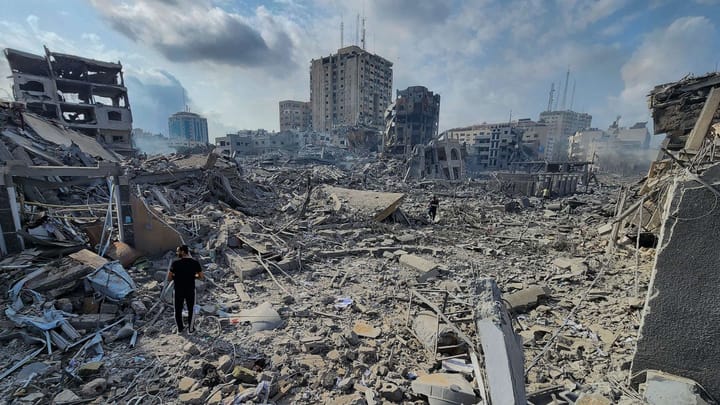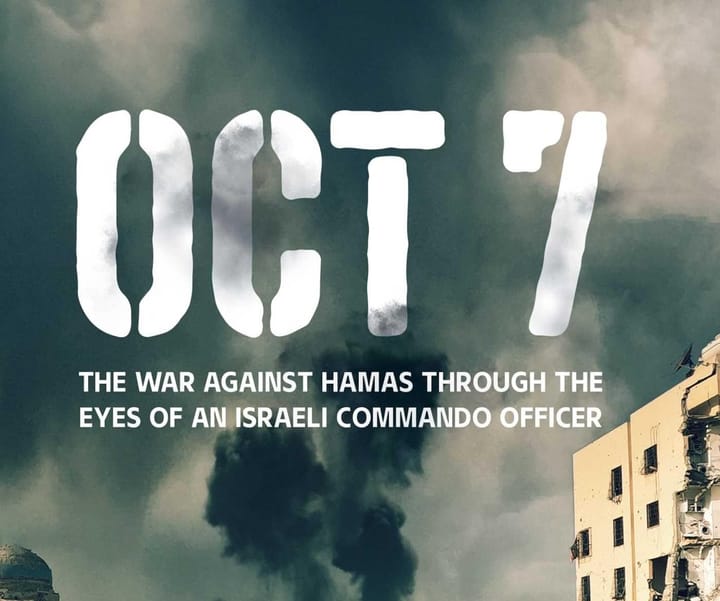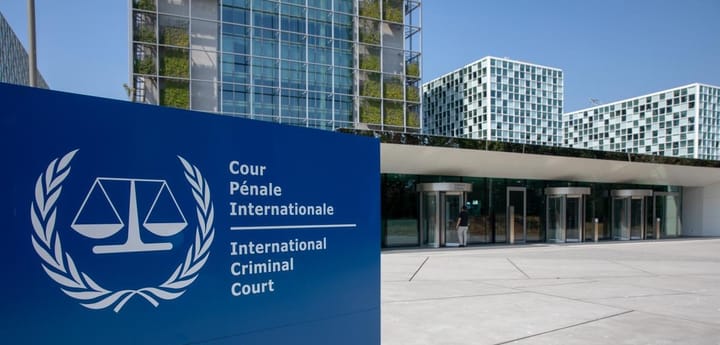Mehdi Hasan & The Art of Defending the Indefensible Acts of Hamas: Implications for Misinformation, Incitement & Global Terror

“I reject the premise of your question…”
Mehdi Hasan
Israel’s war in Gaza is about three things. First, the October 7th massacre in communities in southern Israel was an act of mass murder, mass destruction, and terrorism – the perpetrators must be held to justice, and they can be tried and convicted under any competent court of jurisdiction anywhere on the planet. Secondly, the October 7 massacres were a microcosm of a genocidal plan to wipe out Israelis in the region since 1947. The repeated threat of Palestinian militants to destroy Israelis is well known, and this has created a cycle of revenge and retaliations[1][2][3]. Thirdly, October 7 reflects a much broader regional conflict involving Iranian-induced wars, which has claimed over 1 million lives [combatants and civilians], with the overwhelming majority of these victims being Muslims[4]. Hamas, a splinter Palestinian group funded and armed by Iran’s international destabilizing revolutionary groups, led the October 7th massacres against Israelis[5]. This leaves Israel with no choice but to act to defend its borders from the many armed conflicts exported by Iran into states and countries in the region.
This article examines the shrewd and cunning methods used by Mehdi Hasan, a commentator who uses various mechanisms to absolve Hamas of blame, shift attention from the broader issues, and place the blame on Israel. This post establishes the fact that Mehdi Hasan and many self-labeled peace-seeking commentators on the current Gaza War rationalize the terrorist acts of Hamas on October 7, 2023, through artful rhetoric and selective submission of fact. All this culminates in a trend of disinformation and misleading of huge sections of the public in ways that threaten global peace and security. This article is based on an in-depth critique and evaluation of debates featuring Mehdi Hasan on the current Israel war in Gaza[6][7].
Mehdi Hasan’s Rhetoric Strategy to Rationalize & Justify Hamas’ Mass Murders on October 7, 2023.
The communication path used by Mehdi Hasan in absolving Hamas of mass crimes is as follows:
1. Minimal condemnation of Hamas: First, he issues a quick superficial denouncement of Hamas’ actions on October 7. However, he does it in a way that sweeps the main issue under the carpet – Hamas’ direct liability and accountability for mass murder, mass kidnapping, and torture on the 7th of October, 2023. Even in simple crimes and minor tort cases, the harshest condemnations do not make up for offenders’ liability to be held to account. October 7 was a serious mass crime. It involved killing people in their beds. Killing women and children, raiding a festival. In the end, 1,200 people were slaughtered in cold blood. If a normal citizen of any country shoots one stranger for any reason, they will be arrested, convicted, and most likely spend the rest of their life in prison. For 1,200 people to be killed cruelly in a single day, the pain and suffering cannot be simply erased with a single condemnation of the murderers and the organization that trained and armed them. They must be held accountable for their actions. Therefore, a minor condemnation of such a large-scale act is insufficient if it does not mention the universal legal obligation to hold the perpetrators to account for mass crimes. The superficial nature of this condemnation shows Mehdi Hasan’s true agenda in his so-called victim advocacy plan.
2. Quickly Jump to Attack Israeli Prime Minister Binyamin Netanyahu & Legitimize Hamas by Presenting them as an Egalitarian Negotiating Partner to Israel: In the next act, Mehdi Hasan rushes to attack Netanyahu. He remains mute about the implications and liability of Hamas for the October 7 massacres. Rather, he presents Netanyahu as an illegitimate leader of Israel who is waging war on Gaza to maintain his hold on power and avoid trial and conviction. He asserts that Netanyahu's true motivation is to keep the war going, causing him to avoid negotiating with Hamas for the return of Israeli hostages. At this point, he stops talking about Hamas' liability for October 7 and presents them as a political body, credible enough to negotiate and give back hostages they captured in a mass terror attack. This accusation of Netanyahu is a misrepresentation of the realities on the ground. Israelis are genuinely angry with the perpetrators of the October 7 massacres. They are fed up with the constant threats to their lives and want justice for the victims and complete deterrence afterward. Israelis demanded much more from Netanyahu at the beginning of the October 7 War. If there were an election in Israel on November 7 or December 7 (a month or two after the attacks), Israelis would have voted for a hardliner to hold Hamas to account for the mass murders. And Israel has a lot of hardliners who would have hit Gaza in a much more intense manner. To understand this, listen to the submissions of former Prime Minister Naftali Bennett. He repeatedly criticizes Netanyahu for not moving fast enough in this war. He and many other leading Israeli politicians believe they should have pressured Hamas harder to get the hostages released unconditionally. Under Naftali Bennett, there would likely be no negotiations for the release of any hostages. Many Israeli top military and political figures from the Ariel Sharon era would have done far more extreme things if they were in power. Mehdi Hasan picks on Netanyahu as a matter of convenience in a well-laid-out script that absolves Hamas and shifts the blame to Israel. October 7 was an outrage, and Netanyahu has been relatively more moderate. Outside Israel, there is evidence that other countries would have executed much more grotesque military actions if this happened to them. Take a cue from Türkiye’s war on the PKK and Saudi Arabia's war in Yemen. One thousand two hundred dead Turkish or Saudi civilians would have caused a significant military response. To this end, Netanyahu has been much more conservative in his use of force.
3. Selectively Throw Around International Legal Jargons to Accuse Israel & the Representative of Israel in the Debate: The next thing Mehdi Hasan does is invoke terms with broad meanings in international relations and international law to accuse Israel of genocide. He cites remote and sometimes parallel ongoing incidents in international law as a means of smearing Israel. The South African case against Israel at the International Court of Justice is raised as if it is the world’s Supreme Court and it has summarily convicted Israel. That is misleading. The South African case is nothing but a call for the interpretation of a single statute of a convention to which both Israel and South Africa are signatories. The ICJ’s ruling is not binding. It is an advisory ruling on whether Israel is in breach of a single Convention they signed up to or not. Prosecutors’ request for an ICC warrant to be authorized by judges for a sitting head of a state that is not signatory to the Rome Statute, who is waging an active war that involves people being considered for arrest by the same body, is highly limited. Yet, the respectable-looking Mehdi Hasan is quick to cite a team ICC prosecutor’s recommendation as if it is a conclusive conviction of Israel’s leadership in this war in Gaza. It is from such exaggerations that disinformation and misinformation are concocted in the new media. Mehdi Hasan cherry-picks broad conventions in international law and throws them in to justify his condemnation of Israel. These are dangerously misleading and, together, can contribute to incitement and radicalization of extremists.
4. Cite Individual Cases & Incidents in the Gaza War, and Mislead the Audience Emotionally: While all human suffering is tragic, Mehdi Hasan selectively chooses tragic incidents in the War to further his case. He mentions names of individuals and families in Gaza, and draws graphic images of their suffering. This is a war, not a US presidential election campaign, where people living in relative comfort are mentioned in charming campaign speeches to win votes. Mehdi Hasan conveniently raises these incidents as if Israel is doing these acts out of pleasure or joy. But for the October 7 mass crimes, no one would have had to suffer in Gaza. Hamas, a group led by human beings, could foresee such a possibility before engaging in their killing spree. They should have known the consequences when they embedded themselves in the Gazan civilian population when they knew they were being pursued militarily. And for what reason they were being pursued. While the atrocities of October 7 alone do not justify an extremely harsh military response, Hamas’ deliberate policy of hiding behind these civilians to fight this war cannot be removed from any tragic incident. Every single death. Every single event of wiping out an entire family in Gaza has a connection to a two-step causation – (1) the October 7th attacks, and (2) the deliberate policy of Hamas to hide behind civilians as part of their monopoly on violence over Gaza's population. In that sense, Mehdi Hasan’s accusation that Israel behaves as if “October 7 justifies everything” deliberately suppresses these material facts that ought to be mentioned. He has to recognize that the human suffering in Gaza is not only a result of October 7 but Hamas’ policy of using their monopoly over military and political power in the Gaza Strip to put civilians in the firing line of the Israeli forces. That means any single Gazan casualty is primarily initiated by Hamas' acts and ongoing policies and secondarily caused by a state actor’s enforcement of universal law. Thus, any statistic of Gazan suffering attributed solely to Israel is misleading until it acknowledges Hamas’ role as the primary cause.
5. Blame it all on the “Israeli occupation”: Up till now, Mehdi conveniently keeps Hamas invisible. First, he claims the war in Gaza is all a result of Netanyahu’s quest to hold on to power and avoid prosecution. Then, he talks about Gazan civilians’ suffering. At this stage, Mehdi Hasan imputes the blame on the Israeli occupation of Palestinian lands. This is where his rationalization of October 7 and defense of Hamas actively justifies their acts. He casts all the blame on Israeli control over territories that were to be part of a future Palestinian state as per the 1947 borders that were militarily gambled away by the Egyptian and Jordanian military and political autocrats in 1967. He talks as if the building of Israeli settlements is a crime that cannot be reversed through a transfer of property to a future Palestinian state if they build a legitimate state apparatus. Where in the world will a murderer be allowed to go free because he was provoked by the victim’s existence on their ancestral land? It is absurd. In the worst-case scenario, an illegal occupier will be forced to give back land. And compensation will be decided by an appropriate authority. So, Israeli existence on land demarcated by the United Nations does not justify any October 7 type of attack. He is wont to exaggerate the figures of military violence and military actions by Israel in Palestinian territories prior to October 2023. Yes, Israel is ahead of most countries on the planet in terms of targeting and stopping terror. Israel has used preventive actions to halt a lot of attacks based on the pervasive threat to destroy Israel. At this stage, Mehdi Hasan exaggerates incidents like rape in custody and military misconduct by Israeli soldiers. Such hyperboles reflect small incidents blown out of the context of the precipitating incident that led to this all-out war. These amplifications come together to constitute libel against the world’s only Jewish state, and this shows up repeatedly in media houses that Mehdi Hasan and people like him are linked to.
6. Silent Justification and Rationalization of Hamas: Audiences form their own opinions and conclusions after listening to debates on public platforms. Mehdi Hasan’s emotional appeal and one-way demonization of Israel leave non-technical audiences sympathetic to Hamas and their vile acts of terror. He conveniently condemns October 7 as a one-off incident and refrains from talking about the resultant effects and accountability for the rest of the debate. Mehdi Hasan's famous quotes to deflect his ethical obligations of shaping accurate and fair public opinions in such debates are: "I have no link to Hamas…”; “You should be talking to a representative of Hamas instead..."; "I reject the premise of your question..."; "I repeatedly condemned Hamas before October 7...". However, that does not leave his audiences sufficiently informed because of his (a) exclusion of vital material facts, (b) exaggeration of Israel's errors, which the IDF admits and acts upon in some form even at the height of the war, and (c) deliberate cover-up of the resultant effects of Hamas' actions during this war that systematically put Gazan civilians in harm's way. Mehdi Hasan cloaks himself in pro-human rights clothes. He routinely states he is for the rights of innocent Palestinian civilians. However, we never hear him calling on Hamas to surrender. He never mentions the chain of causation and aftermath of Hamas' systematic actions. It is always about the Israeli bomb, never about the secondary explosion of Iranian-manufactured Hamas rockets. This is tantamount to a rationalization of Hamas' actions. He gives his audiences an impression that Hamas militants were driven by compulsion to execute the October 7 massacres, and are now justified to hide behind the same Gazan civilians he claims to advocate for.
Putting it All Together
Empirical studies have shown that misinformation facilitates radicalization among individuals with high self-uncertainty, low cognitive flexibility, grievances, and/or experience social exclusion[8]. The level of lies, disinformation, misinformation, and harmful information in the Global South and specific spaces in the Global North about this Palestinian conflict is shocking. It breeds anger and conditions that will inevitably lead to radicalization and terror. Mehdi Hasan’s abuse and misuse of broad international law concepts without pausing to acknowledge the pervasive linkage to Hamas’ acts on October 7 contributes to the misuse of information.
Normative international law, by default, is a shield, not a sword. It is meant to provide a legal framework for different nations, peoples, states, and non-state actors to interact and develop equitable and universally acceptable standards. Hamas’ actions and its aftermath significantly affected the smooth evolution of international law. Mehdi Hasan’s selective invocation and application of international law principles to rationalize Hamas’ actions constitutes a weaponization of this equitable process. This attempt to use international law as a sword rather than a shield is a bid to protect a group that has committed a serious mass murder of over 1,200 random unarmed civilians in cold blood, with no immediate justification.
The imperative obligations of Israel, as the main state actor in this situation, are to (1) hold the perpetrators of the October 7 massacres to account, (2) secure the borders of Israel and the Palestinian territories by destroying the military infrastructure of Hamas, a terror group that shown they are an imminent threat to all – a textbook example of a ticking time bomb scenario, under customary international law, and (3) stop the stream of Iranian-funded terror in the region, which has cost over a million Muslim lives, from entering the borders of the only Jewish state that Iran has sworn to destroy on many occasions.
Conclusion
The learned Mehdi Hasan should know better and avoid rationalizing the October 7 massacres, which are crimes that can be tried and punished under every state jurisdiction on the planet. His submissions contribute to incitement. A person with no possibility of decoding or fact-checking Mehdi Hasan’s line of argument on this conflict is likely to endorse or engage in arbitrary acts of violence against the Israelis, Americans, British, or European nationals. While Mehdi Hasan is quick to wave his British and American citizenship in these debates, he must be aware that he is inadvertently putting all his countrymen in danger by inciting sections of the global population to form extremist conclusions after listening to his line of argumentation which omits material facts about Hamas’s direct responsibilities for the war and exaggerates issues with no direct applicability in the current Gaza war. Lines of communication that deliberately delete vital components of an ongoing war that risks spreading regionally and globally should have no place in the international media.
[1] Thomas Pettigrew. “Peoples Under Threat: Americans, Arabs, and Israelis" Peace & Conflict: Journal of Peace Psychology 9 (1), 2009, pp69-90 DOI: 10.1207/S15327949PAC0901_03
[2] Johannes Haushofer, Anat Biletzki & Nancy Kanwsher. "Both sides retaliate in the Israeli–Palestinian conflict" PNAS 107 (42) DOI: 10.1073/pnas.1012115107
[3] Noura Erakat. "The Sovereign Right to Kill: A Critical Appraisal of Israel’s Shoot-to-Kill Policy in Gaza" International Criminal Law Review 19 (5) 2019 pp783-818 DOI: 10.1163/15718123-01905002
[4] According to conservative estimates of the top three conflicts in the region since 2011:
a. Syrian Civil War (2011 to present): 500,000+ deaths,
b. War in Iraq (2013-2017): 150,000+ deaths,
c. Yemen Civil War (2015 to present): 350,000+ deaths
[5] Smyth, Phillip. “The Path to October 7: How Iran Built Up and Managed a Palestinian ‘Axis of Resistance’” CTC Sentinel 16 (11), 2023 Available at: https://ctc.westpoint.edu/the-path-to-october-7-how-iran-built-up-and-managed-a-palestinian-axis-of-resistance/
[6] Primary Debate 1: https://www.youtube.com/watch?v=DQzKw30LeTA
[7] Primary Debate 2: https://www.youtube.com/watch?v=Fqm2mJ9Qg74
[8] Elise M. Roberts-Ingleson & Wesley S. McCann. "The Link Between Misinformation & Radicalisation: Current Knowledge & Areas for Future Inquiry" Perspectives on Terrorism XVII (I) 2023 pp36-49




